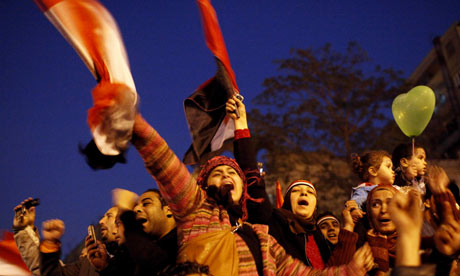A first draft of why it happened must begin in a rural town in Tunisia on the shores of the Mediterranean where Mohamed Bouazizi was the unlikeliest catalyst of the extraordinary realignment in the region.
Known locally as Basboosa, Mohamed, aged 26, was a street fruit vendor in Sidi Bouzid, where unemployment is conservatively estimated at 30%. He earned around £87 a month, the money going to support his six siblings, including one sister in university. He was regularly stopped by police, who expected him to pay them bribes to allow him to sell his wares from a wheelbarrow. On the morning of 17 December last year he had spent the equivalent of £125 on merchandise when it was seized.
What made the loss harder to take was the humiliation. A 45-year-old female officer slapped him across the face, spat at him, scattered his fruit on the ground and confiscated his electronic scales. Two of her colleagues joined in, beating him. As a coup de grace, the woman insulted Mohamed's dead father, a labourer who died of a heart attack when his eldest son was just three years old.
Mohamed finally snapped. For decades millions of young men like him right across the North African coastal plain have watched television images beamed from the other side of the Mediterranean from a European continent of prosperity, freedom and opportunity. They have watched the cronies of their own regimes growing older and, in their decadence, more arrogant and corrupt. They have watched hope for a better future leaking away.
Seeking justice, Mohamed went to the local governor's office to complain about his treatment. He issued a warning when told that the governor was unavailable: "If you don't see me, I'll burn myself." At 11.30am, less than an hour after he had been robbed and humiliated by the state's forces, he doused himself in petrol in front of the governor's office and set himself alight.
"What kind of repression do you imagine it takes for a young man to do this?" said his sister Samia when her brother finally died of horrific injuries on 4 January. "A man who has to feed his family by buying goods on credit when they fine him ... and take his goods. In Sidi Bouzid, those with no connections and no money for bribes are humiliated and insulted and not allowed to live."
For decades Tunisia had been characterised by the west as a "model" Arab nation, but the WikiLeaks saga, months earlier, revealed the ugly truth of what its key sponsor, the United States, really thought of this "mafia state", run as a virtual private enterprise by Ben Ali and his hated, avaricious wife Leila Trabelsi, who plundered 1.5 tonnes of gold from the central bank when they fled to Jeddah in Saudi Arabia.

In Egypt, Khaled Said was beaten to death by the two officers who came looking for him. They smashed his head against a marble ledge in the lobby of the building next door before throwing his body into the back of a van, driving around, then dumping it by the roadside. It later emerged that Said had taped a secret video depicting what appeared to be corrupt local security chiefs dividing up the spoils of a drugs bust. His family also discovered self-penned anti-government songs stored on his computer.
Online, Facebook group "We are all Khaled Said", quickly gathered hundreds of thousands, of supporters, who swapped information on other examples of inhumane police treatment and helped organise small-scale acts of civil disobedience.
Along with a loose network of more explicitly political online activist groups, the anonymous administrators behind Kolina Khaled Said – one of whom turned out to be Google's regional marketing executive, Wael Ghonim, who attended to the web page from his home 1,500 miles away in Dubai – tried to find creative ways to get round Egypt's suffocating legal prohibitions on collective action in an effort to make their voices heard on the ground.


No comments:
Post a Comment